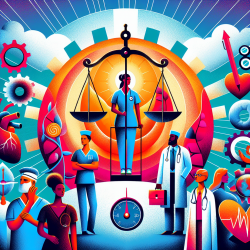The recent study titled The Association of Moral Injury and Healthcare Clinicians’ Wellbeing: A Systematic Review sheds light on a crucial but often overlooked aspect of healthcare: moral injury. Understanding moral injury is essential for healthcare practitioners aiming to improve their professional and personal wellbeing. This blog delves into the key findings of the study and offers actionable insights for practitioners.
Understanding Moral Injury
Moral injury refers to the psychological distress experienced when one's actions, or the actions of others, violate their moral or ethical code. This study utilized definitions by Shay and Litz and Kerig to examine how moral injury impacts healthcare clinicians.
Key Findings
The systematic review revealed several important associations between moral injury and various aspects of clinicians' wellbeing:
- Professional Wellbeing: Moral injury is strongly linked to burnout, compassion fatigue, and secondary traumatic stress. For instance, clinicians experiencing moral injury reported higher levels of burnout and compassion fatigue.
- Personal Wellbeing: Moral injury is associated with adverse mental health outcomes such as depression, anxiety, and PTSD. The study found that clinicians with higher levels of moral injury also experienced greater levels of stress and emotional exhaustion.
- Institutional Support: Lack of institutional support and power imbalances were identified as significant contributors to moral injury. Conversely, environments that provide robust support systems help mitigate the effects of moral injury.
Actionable Insights for Practitioners
Based on the findings, healthcare practitioners can take several steps to improve their wellbeing:
- Seek Institutional Support: Advocate for better support systems within your organization. This could include mental health resources, peer support groups, and regular debriefing sessions.
- Focus on Self-Care: Prioritize self-care activities such as mindfulness, exercise, and adequate rest to mitigate the effects of moral injury.
- Engage in Professional Development: Participate in training programs that focus on resilience and coping strategies to better handle high-stakes situations.
Encouraging Further Research
While the study provides valuable insights, it also highlights the need for further research. Understanding the nuanced experiences of moral injury across different healthcare roles can help develop targeted interventions. Practitioners are encouraged to contribute to this growing body of research to enhance the collective understanding of moral injury.
To read the original research paper, please follow this link: The Association of Moral Injury and Healthcare Clinicians’ Wellbeing: A Systematic Review.










